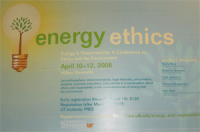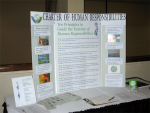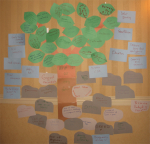

Energy & Responsibility: a challenge for the 21st century
by Nina GREGG
Associated Central Topics:
Environment and responsibility .
Associated General Topics:
Sustainable development .
Youth .
Nearly 200 people gathered in Knoxville, Tennessee April 10-12, 2008 for “Energy Responsibility: a conference on ethics and the environment.”
Interdisciplinary exchange
The conference brought together ethicists, legal theorists, policy makers, industry representatives and environmental activists to engage in a conversation about ethics and responsibility in the contested terrain of energy and the environment. Five keynote speakers (Robert H. Socolow, Princeton University; Henry Shue, Merton College, Oxford ; Richard Morgenstern, Resources for the Future ; Dale Bryk, Natural Resources Defense Council and Yale University and Dale Jamieson, New York University) challenged audiences to consider the range of interventions, alternatives and actions available to individuals, communities and governments. Along with projections of future scenarios under different interventions, the speakers described the implications for all living beings of the United States’ slowness to implement significant climate change policies.
A wide range of issues and topics
In eighteen sessions across two days, conference participants considered a wide range of topics, including the ethics of irreversibility; environmental justice and responsibility; the legal, environmental, and moral implications of cross-ridge coal mining; proposals such as carbon trading and carbon caps; justice, capitalism and energy; technological solutions including carbon sequestration and nuclear waste storage; corporate responsibility; individual and collective responsibility; and planning for alternative energy enterprises.
Responsibility for the Future
Nina Gregg of the US CHR committee invited Chuline Carson, Earth Charter Atlanta and Don Huisingh, representing Green Cross, to collaborate on a workshop on ‘Using Ethics to Inform Responsible Action.’ Twenty workshop participants became familiar with the ethical commitments of the Charter of Human Responsibilities, Earth Charter and Green Cross. Using the Responsibility for the Future exercise, workshop participants then created a graphic image of ‘our dream of our energy future.’ The exercise leads participants through imagining what we want the future to be, identifying barriers that constrain the achievement of the desired future, and consideration of resources that are available to overcome those barriers. The workshop closed with commitments to action from each participant.
Youth caucus presents statement
During the conference a youth caucus convened to consider the responsibility of higher education in addressing energy issues, and the role of students in addressing energy issues with respect to current generations, our future, and our prosperity. Caucus members reviewed the Charters of Responsibility created by youth in India, the Philippines, and Brazil. The conference closed with a compelling statement presented by the youth caucus, who made it clear that they are assuming responsibility now for the conditions we have delivered to them.
| Youth Statement
Energy Responsibility Conference Student Caucus University of Tennessee April 12, 2008 The youth of the world have inherited a transformative mandate from the generations that have come before us. Deprived of the luxury to treat the future as a landfill, the unprecedented urgency of this mandate compels us to build a radically new world of healthy, just, and sustainable communities within our lifetimes. We are genuinely angered by the wasteful economy we were born into and we are committed to intergenerational dialogue with those who all their lives have fought the struggle we now take on. Amid uncertainty, we find hope; and in the long shadow of the challenges that loom on our horizons, we have no choice but to seek the light of opportunity. We envision a just and sustainable world, a world of healthy communities living in harmony with their natural environment. Recognizing the solutions to global pollution and global poverty as inseparable, we are committed to opening spaces that transcend borders and disciplines for democratic, international conversation. To that end, we must address the threat of human development to the biodiversity of the planet and the threat of cultural dominance to the indigenous knowledge that must inform our global solutions. The privilege of leadership comes with the responsibility to defend the rights of all voices as we define a vision of the future. In addition to empowering a planetarian imagination, we are committed to decentralized solutions on the grassroots level grounded in the principles of distributional equity and environmental justice. As we forge the policies and infrastructure of the future, we can no longer violate the self-determination of local communities around the world nor the intrinsic value of the biosphere that makes our lives possible. In our own communities, we are committed to nurturing future generations by actively promoting civic engagement and increased ecological awareness in our schools and in our homes. Building on the traditions of democracy and human rights, we must create an ecologically comprehensive definition of social justice embracing lifelong nutrition education, localized food security, and consideration of the long-term impacts of the choices we make as consumers and citizens every day of our lives. We sow the seeds of tomorrow in the soil of today. We call upon all citizens, policymakers, and business leaders to implement the inexcusably neglected knowledge of solutions already in place for a renewed and equitable relationship with the planet. In addition, while we include advocacy and research in a diversity of tactics, we believe that global challenges call for local solutions from the inside out and the bottom up. It has fallen to our generation to cultivate healthy, sustainable communities across the planet. The work before us is large, but we are up to the task. We will bring upwardly mobile green-collar jobs into disenfranchised communities. We will advance access to environmental education to promote stewardship and sustainability in the lives of children. We will pursue technological innovations for climate-neutral production as we transition from where we are to where we have to go. And in our professions and amongst our peers, we will cultivate an ethic of democracy, compassion, and justice as practices necessary to the survival of the planet. The decisions we make today will have a greater impact on the future than at any other point in history. We call on you to be voices for the future in the lives you live today. The future simply cannot wait. The time to act is now. |
Conference organization and documentation
The Energy Responsibility Conference was proposed two years ago by the US Charter Coordinator. A planning committee designed the conference, sought sponsors, invited and recruited participants, requested proposals for presentations and workshops, reviewed and made selections from among all the proposals, and handled logistics. One-fifth (20%) of the conference budget went to scholarships to enable the participation of activists and people from outside the US. We welcomed registrations from Australia, Canada, Denmark, Ghana, Iceland, India, Jordan, Nepal, the Netherlands, Nigeria, Puerto Rico, Serbia, Sweden, Switzerland and the UK in addition to the US.
The University of Tennessee hosted the conference with sponsorship from the Charter of Human Responsibilities (US), ALCOA, TVA, Oak Ridge National Laboratories, Knox Area Transit, and the Sierra Club, Tennessee Chapter. Additional support came from Tennessee Interfaith Power Light (http://www.tn-ipl.org/) and the International Society for Environmental Ethics.
The keynote presentations were videotaped for use by mass media, including C-SPAN, a non-commercial media company with a mission to provide public access to the political process (http://www.c-span.org/).
An edited volume of selected presentations, including the keynote presentations, is in preparation.
Next steps
The conference has stimulated discussion regarding future CHR events, including working with youth climate change activists (see www.climateaction.net and www.ejcc.org) on another conference with an emphasis on responsibility and action.





